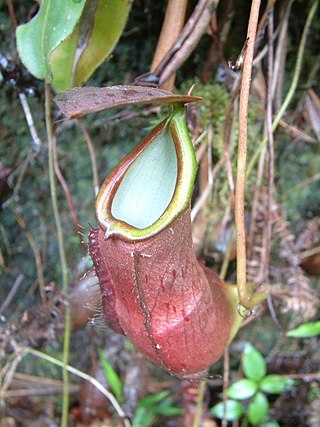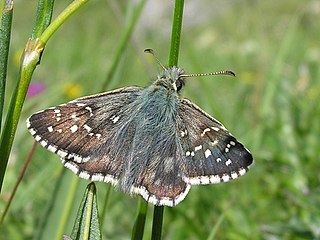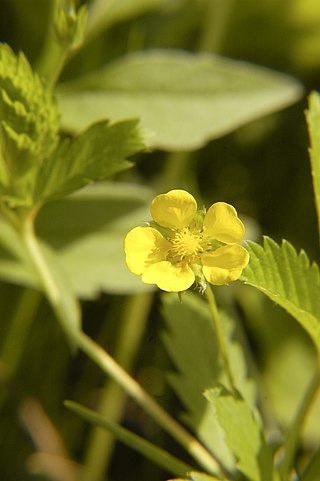
The rose subfamily Rosoideae consists of more than 850 species, including many shrubs, perennial herbs, and fruit plants such as strawberries and brambles. Only a few are annual herbs.

Potentilla is a genus containing over 500 species of annual, biennial and perennial herbaceous flowering plants in the rose family, Rosaceae.

Potentilla erecta is a herbaceous perennial plant belonging to the rose family (Rosaceae).

Eurycoma longifolia is a flowering plant in the family Simaroubaceae. It is native to Indochina and Indonesia, but has also been found in the Philippines. The plant is a medium-sized slender shrub that can reach 10 m (33 ft) in height, and is often unbranched. The root of the plant has been used in folk medicine of the South East Asian region, and in modern times has common use as supplements, as well as food and drink additives.

Mentha longifolia, also known as horse mint, brookmint, fillymint or St. John's horsemint, is a species of plant in the family Lamiaceae. It is native to Europe excluding Britain and Ireland, western and central Asia, and northern and southern Africa.

Argentina (silverweeds) is a genus of plants in the rose family (Rosaceae) which is accepted by some authors, as containing 64 species, but classified in Potentilla sect. Leptostylae by others.

Potentilla reptans, known as the creeping cinquefoil, European cinquefoil or creeping tormentil, is a flowering plant in the family Rosaceae.

Potentilla indica, known commonly as mock strawberry, Indian-strawberry, or false strawberry, often referred to as a backyard strawberry, mainly in North America, is a flowering plant in the family Rosaceae. It has foliage and an aggregate accessory fruit similar to that of a true strawberry. It has yellow flowers, unlike the white or slightly pink flowers of true strawberries. It is native to eastern and southern Asia, but has been introduced to many other areas as a medicinal and an ornamental plant, subsequently naturalizing in many regions worldwide. It is considered invasive in some regions of the United States.

Nepenthes longifolia is a tropical pitcher plant endemic to Sumatra, where it grows at elevations of between 300 and 1100 m above sea level. The specific epithet longifolia, formed from the Latin words longus (long) and folius (leaf), refers to the exceptionally large leaves of this species.

Oberthür's grizzled skipper is a species of skipper.

The Olive Skipper is a species of skipper.

Acacia longifolia is a species of Acacia native to southeastern Australia, from the extreme southeast of Queensland, eastern New South Wales, eastern and southern Victoria, southeastern South Australia, and Tasmania. Common names for it include long-leaved wattle, acacia trinervis, aroma doble, golden wattle, coast wattle, sallow wattle and Sydney golden wattle. It is not listed as being a threatened species, and is considered invasive in Portugal, New Zealand and South Africa. In the southern region of Western Australia, it has become naturalised and has been classed as a weed by out-competing indigenous species. It is a tree that grows very quickly reaching 7–10 m in five to six years.

Madhuca longifolia is an Indian tropical tree found largely in the central, southern, north Indian plains and forests, Nepal, Myanmar and Sri Lanka. It is commonly known as madhūka, madkam, mahuwa, Butter Tree, mahua, mahwa, mohulo, Iluppai, Mee or vippa chettu. It is a fast-growing tree that grows to approximately 20 meters in height, possesses evergreen or semi-evergreen foliage, and belongs to the family Sapotaceae. It is adaptable to arid environments, being a prominent tree in tropical mixed deciduous forests in India in the states of Odisha, Chhattisgarh, Jharkhand, Uttar Pradesh, Bihar, Maharashtra, Andhra Pradesh, Madhya Pradesh, Kerala, Gujarat, West Bengal and Tamil Nadu.

Panonychus ulmi, the European red mite, is a species of mite which is a major agricultural pest of fruit trees. It has a high reproductive rate, a short generation time and produces many broods in a year, all of which contribute to its pest status. It has a cosmopolitan distribution, and a very wide host range, having been found on the following plants:

Drymocallis is a genus of plants formerly included with the typical cinquefoils (Potentilla). It contains three species known or suspected to be protocarnivorous, but more cinquefoils might eventually be moved here:
P. longifolia may refer to:

Potentilla simplex, also known as common cinquefoil or old-field five-fingers or oldfield cinquefoil, is a perennial herb in the Rosaceae (rose) family native to eastern North America from Ontario, Quebec, and Labrador south to Texas, Alabama, and panhandle Florida.















